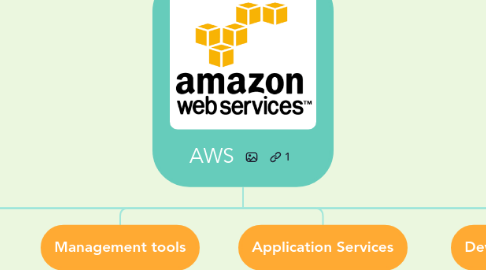AWS
Jean-Pierre Pelletierにより


1. Networking & Content Delivery
1.1. VPC
1.2. Cloud Front
1.3. Direct Connect
1.4. Route 53
2. Compute
2.1. EC2
2.2. EC2 Container Service
2.3. Elastic Beanstalk
2.4. Lambda
2.5. Lightsail
2.6. Batch
3. Storage
3.1. S3
3.1.1. Store an object
3.1.2. Simple Storage Service
3.2. Glacier
3.2.1. Archive
3.3. EFS
3.4. Storage gateway
3.4.1. Connect S3, virtual machine
4. Databases
4.1. RDS
4.1.1. Relationnal Database Service
4.2. DynamoDB
4.3. Redshift
4.3.1. Data warehouse
4.4. Elasticache
4.4.1. Cache it
5. Migration
5.1. Snowball
5.2. DMS
5.2.1. Database Migration Service
5.2.2. You can change database
5.3. SMS
5.3.1. Server Migration Service
6. Analytics
6.1. Athena
6.2. EMR
6.2.1. Process large amount of data
6.3. Cloud Search
6.4. Elastic Search
6.5. Kenesis
6.6. Data pipeline
6.7. Quick Sight
7. Security & Identity
7.1. IAM
7.1.1. Identity and Access Management
7.2. Inspector
7.3. Certificate manager
7.4. Directory Service
7.5. WAF
7.6. Artifact
8. Management tools
8.1. Cloud Watch
8.1.1. Ressources
8.2. Cloud Formation
8.3. Cloud Trail
8.3.1. Auditing
8.4. Opsworks
8.5. Config
8.6. Service catalog
8.7. Trusted Advisor
9. Application Services
9.1. Step Functions
9.1.1. Coordinate microservices
9.2. SWF
9.2.1. Simple Workflow Service
9.3. API Gateway
9.4. AppStream 2.0
9.5. Elastic Transcoder
10. Developer Tools
10.1. CodeCommit
10.1.1. Like GitHub, store code
10.2. CodeBuild
10.3. CodeDeploy
10.4. CodePipeline
11. Mobile Services
11.1. Mobile Hub
11.2. Cognito
11.3. Device Farm
11.4. Mobile Analytics
11.5. Pinpoint
12. Business Productivity
12.1. WorkDocs
12.2. WorkMail
13. Internet of Things
13.1. iOT
13.2. Greengrass
14. Desktop & App Streaming
14.1. WorkSpaces
14.2. AppStream 2.0
15. Artificial Intelligence
15.1. alexa
15.1.1. echo
15.2. lex
15.3. Polly
15.4. Machine Learning
15.4.1. Analyse dataset for future decision
15.5. Rekognition
15.5.1. Identify on a photo
16. Messaging
16.1. SNS
16.1.1. Simple Notification Service
16.2. SQS
16.2.1. Simple Queue Service
16.3. SES
16.3.1. Simple Email Service
